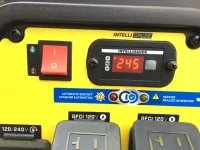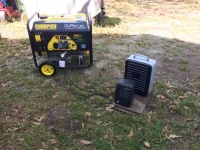An old trick motorcycle guys use to help keep their carbureted motors running even after long-term storage is to use a little 2-cycle oil in the gas.I didn't crank it yesterday. I picked some gasoline up last night and added some Stabil to it. Gotta oil it up today and fire it up. I'm going to round up a couple of electric heaters and figure out somehow to partially enclose them somehow so they'll cycle on and off. I like the size of the generator, it really isn't as big as I thought it would be but it is wider than I envisioned. It's easy for me to read specs but hard to visualize them.
One thing that does cause me a little concern is security against theft. I live rural and the generator sits in an opened ended garage. Many years ago I had a small Coleman 1800w suitcase generator and a small air compressor stolen out of there. I'm pretty sure it was some local dopeheads who had been by earlier looking for scrap metal and who I ran off the place. Proving it is another story, though.We've been here 30+ years and have had four instances of theft (one breaking and entering event). Currently I've got the generator and my big tiller cabled together with a lock. Anybody got some good ideas on securing the generator (and tiller for that matter)? I've got no lockable shed to secure it inside of. I've got plenty of chain and can come up with more locks.
I add 1oz of TCW-3 marine 2-cycle oil to a 5 gallon gas can, in addition too the Stabil (the blue marine kind). The oil mix is only 640:1, so there is not much in there. It is enough oil to help fight corrosion when you run the carb dry and store the generator. It leaves a slight oil film in the carb and engine and also in the fuel tank. I like the TCW-3 marine stuff because it has corrosion inhibitors and it is ashless. The oil also helps lubricate the carb and intake valve, too.



